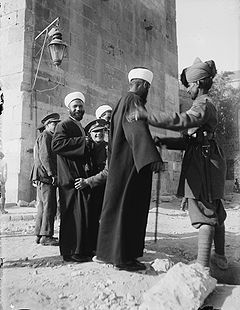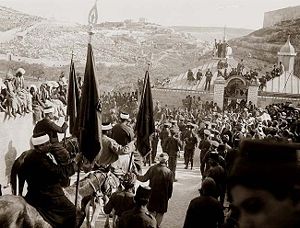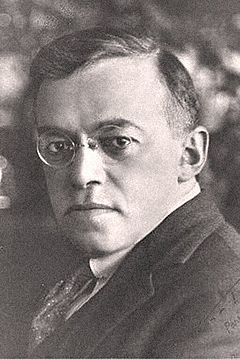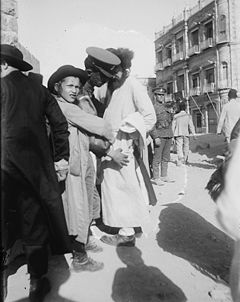- 1920 Palestine riots
-
The 1920 Palestine riots, or Nabi Musa riots, took place in British Mandate of Palestine April 4–7, 1920 in and around the Old City of Jerusalem.
The events coincided with and are named after the Christian/Muslim Easter holiday Nabi Musa and followed rising tensions in Arab-Jewish relations over the implications of Zionist immigration, tensions which coincided with attacks on outlying Jewish settlements in the Galilee. Speeches by Arab religious leaders during the festival, in which traditionally large numbers of Muslims gathered for a religious procession, led to a serious outbreak of violent assaults on the city's Jews, with five Jews killed and hundreds wounded.
The British military administration's erratic response failed to contain the rioting, which continued for four days. As a result of the events, trust between the British, Jews, and Arabs eroded. One consequence was that the Jewish community increased moves towards an autonomous infrastructure and security apparatus parallel to that of the British administration.
Contents
Prelude
On 5 December 1918, The Eastern Committee of the British Cabinet met to discuss the future of Palestine. Lord Curzon chaired the meeting. General Smuts, Lord Balfour, Lord Robert Cecil, General Sir Henry Wilson, Chief of the Imperial General Staff, T. E. Lawrence, and representatives of the Foreign Office, the India Office, the Admiralty, the War Office, and the Treasury were present. Lord Curzon stated:
'The Palestine position is this. If we deal with our commitments, there is first the general pledge to Hussein in October 1915, under which Palestine was included in the areas as to which Great Britain pledged itself that they should be Arab and independent in the future . . . Great Britain and France - Italy subsequently agreeing - committed themselves to an international administration of Palestine in consultation with Russia, who was an ally at that time . . . A new feature was brought into the case in November 1917, when Mr Balfour, with the authority of the War Cabinet, issued his famous declaration to the Zionists that Palestine 'should be the national home of the Jewish people, but that nothing should be done - and this, of course, was a most important proviso - to prejudice the civil and religious rights of the existing non-Jewish communities in Palestine. Those, as far as I know, are the only actual engagements into which we entered with regard to Palestine.
Now, as regards the facts, they are these. First, Palestine has been conquered by the British, with only very insignificant aid from small French and Italian contingents, and it is now being administered by the British. The Zionist declaration of our Government has been followed by a very considerable immigration of Jews. One of the difficulties of the situation arises from the fact that the Zionists have taken full advantage - and are disposed to take even fuller advantage - of the opportunity which was then offered to them. You have only to read, as probably most of us do, their periodical 'Palestine', and, indeed, their pronouncements in the papers, to see that their programme is expanding from day to day. They now talk about a Jewish State. The Arab portion of the population is well-nigh forgotten and is to be ignored. They not only claim the boundaries of the old Palestine, but they claim to spread across the Jordan into the rich countries lying to the east, and, indeed, there seems to be very small limit to the aspirations which they now form. The Zionist programme, and the energy with which it is being carried out, have not unnaturally had the consequence of arousing the keen suspicions of the Arabs. By 'the Arabs' I do not merely mean Feisal and his followers at Damascus, but the so-called Arabs who inhabit the country. There seems, from the telegrams we receive, to be growing up an increasing friction between the two communities, a feeling by the Arabs that we are really behind the Zionists and not behind the Arabs, and altogether a situation which is becoming rather critical . . .' [1]After Emir Faisal I expressed support for a Jewish National Home in Palestine by signing the Faisal-Weizmann Agreement at the Paris Peace Conference of 1919, and the subsequent breakdown of that agreement led to worsening relations among Arabs, Jews and the British military authorities in Palestine.
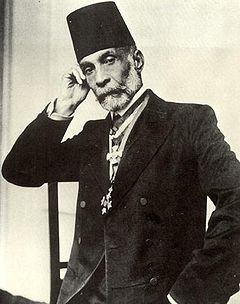 Musa Kazim al-Husayni, the mayor of Jerusalem, was dismissed by the British after the April riots
Musa Kazim al-Husayni, the mayor of Jerusalem, was dismissed by the British after the April riots
The Faisal-Clemenceau agreement was to be considered, according to Faisal himself, still-born. Every decision regarding Syria, Palestine and Mesopotamia taken without his active participation would not be recognized by Arabs and would provoke difficulties for which he disclaimed any future responsibility. Between France and the United Kingdom, serious disagreements existed over borders, water rights, Zionist claims over areas of French-held Lebanese and Syrian territory, and the rights of Christians, for whose security in Palestine France had traditional capitulary responsibilities. In Syria, under French authority, pan-Arab nationalists pressed for the "liberation" of Palestine.
From January 1920 onwards, relations between Zionist leaders and the British military administration deteriorated, as the former, led by Chaim Weizmann, pressed for unconditional immigration, the loosening of wartime restrictions on land purchase and the reduction of Syrians in the administration, in favour of more British and Jewish functionaries, and the latter posed as defenders of the Arab population. A declaration by General Louis Bols on 18 February, drafted to reassure Arabs, had little effect. Nine days later, Palestinian Arabs in Damascus held a general congress calling for the unification of the territory with Syria, while Muslims and Christians held peaceful public protest rallies throughout Palestine.[2]
Both occupying powers experienced difficulties with local peasant armed bands ( 'isabat), after Britain had withdrawn its troops from both the Bekaa valley and the Galilee in autumn 1919. By February 1920, these groups, which often operated in liaison with political organisations, began attacking Jewish settlements in the Galilee, such as Metula, Tel Hai and Kfar Giladi.
On March 1, the death at Tel Hai of Joseph Trumpeldor, who became a symbol of heroism to Zionists and a veteran of the Russo-Japanese War who mobilized the defence of the settlements, at the hands of a Shiite gang from Southern Lebanon, caused deep concerns among Zionist leaders, who made numerous requests to the Mandate administration to address the Yishuv's security and forbid a pro-Syrian public rally. Their fears were largely discounted, however, by the Chief Administrative Officer General Louis Bols, Governor Sir Ronald Storrs and General Edmund Allenby, despite a warning from the President of the World Zionist Organization Dr. Chaim Weizmann that "pogrom is in the air", supported by assessments available to Storrs.[3]
Weizmann was convinced the British Army identified the Jews with Bolsheviks intent on driving out the local population. Communiqués had been issued about foreseeable troubles between Arabs and Jews (by an administration which had to impose unpopular policies on the Arabs); to Weizmann these were reminiscent of instructions that Russian generals had issued on the eve of pogroms.[4] In the meantime, local expectations had been raised to a pitch by the declaration of the Syrian Congress on March 7 of the independence of Syria and Palestine, with Faisal as its king. Preoccupied by the possible menacing reverberations of this announcement, Bols reverted his decision.[5]
Storrs issued a warning to Arab leaders, but his forces included only 188 policemen, among them but eight officers. The Ottoman Turks had usually deployed thousands of soldiers, and even an artillery piece, to keep order in the narrow streets of Jerusalem during the Nabi Musa procession. Zionist leaders request that the British authorities allow arming of the Jewish defenders to make up for the lack of adequate troops. Although this request was declined, Ze'ev Jabotinsky, together with Pinhas Rutenberg, led an effort to openly train Jewish volunteers in self-defense, an effort which the Zionist Commission kept the British informed of. Many of them members of the Maccabi sports club and some of them veterans of the Jewish Legion, their month of training largely consisted of calisthenics and hand to hand combat with sticks.[3] By the end of March, about 600 were said to be performing military drill daily in Jerusalem.[6] Jabotinsky and Rutenberg also began organising the collection of arms.[6]
Richard Meinertzhagen, "at once a great antisemite and a great Zionist",[7] chief political officer of the British forces, in an analysis of the atmosphere written at the end of March, identified Palestinian awareness that they would now be dispossessed of their lands by an intellectually and financially superior people, together with Faisal's recent proclamations as king of both Syria and Palestine, as the causes for their constant agitation.[8] However, in the short term, he foresaw no prospect of troubles, and his position was adopted by Herbert Samuels, who thought the Army was overreacting, in an alarmist fashion, to the Faisal declaration
April 4–7, 1920 in the Old City
The annual Nabi Musa spring festival was instituted by the Ottoman Turks to ensure a Muslim presence in Jerusalem during the influx of Christian pilgrims celebrating the Easter holiday. Arab educator and essayist Khalil al-Sakakini described how tribes and caravans would come with banners and weapons.[3]
By 10:30 a.m. on April 4, 1920, 60,000–70,000 Arabs had already congregated in the city square, and groups of them had already been attacking Jews in the Old City's alleys for over an hour; the Jews hid. Inflammatory anti-Zionist rhetoric was being delivered from the balcony of the Arab Club. One inciter was Hajj Amin al-Husayni; his uncle, the mayor, spoke from the municipal building's balcony.
The editor of the newspaper Suriya al-Janubia (Southern Syria), Aref al-Aref, delivered his speech on horseback. The crowd shouted "Independence! Independence!" and "Palestine is our land, the Jews are our dogs!"[3] Arab police joined in applause, and violence started.[9] The Arab mob ransacked the Jewish Quarter of Jerusalem, attacked pedestrians and looted shops and homes. They ripped open their quilts and pillows, sending up clouds of feathers associated by Jews with the European pogroms. The Torath Chaim Yeshiva was raided, and Torah scrolls were torn and thrown on the floor, and the building then set alight.[3] During the next three hours, 160 Jews were wounded.[9]
Khalil al-Sakakini witnessed the eruption of violence in the Old City:
- "[A] riot broke out, the people began to run about and stones were thrown at the Jews. The shops were closed and there were screams... I saw a Zionist soldier covered in dust and blood... Afterwards, I saw one Hebronite approach a Jewish shoeshine boy, who hid behind a sack in one of the wall's comers next to Jaffa Gate, and take his box and beat him over the head. He screamed and began to run, his head bleeding and the Hebronite left him and returned to the procession... The riot reached its zenith. All shouted, "Muhammad's religion was born with the sword"... I immediately walked to the municipal garden... my soul is nauseated and depressed by the madness of humankind."[10]
The British response was erratic. After the violence broke out, Ze'ev Jabotinsky met Governor Storrs and suggested deployment of his volunteers, but his request was rejected. Storrs confiscated his pistol and demanded to know the location of his other weapons, mentioning that Jabotinsky should be arrested for possessing a firearm. Later, Storrs changed his mind and asked for 200 volunteers to report to the police headquarters to be sworn in as deputies. After they arrived and the administering of the oath had begun, orders came to cease and he sent them away. Arab volunteers had also been invited, and were likewise sent away. The army imposed night curfew on Sunday night and arrested several dozen rioters, but on Monday morning they were allowed to attend morning prayers and were then released. Arabs continued to attack Jews and break into their homes, especially in Arab-majority mixed buildings.[3]
On Monday, as disturbances grew worse, the Old City was sealed off by the army and no one was allowed to exit the area. Martial law was declared, but looting, burglary, rape, and murder continued. Several homes were set on fire, and tombstones were shattered. British soldiers found that the majority of illicit weapons were concealed on the bodies of Arab women.[3]
On Monday evening, the soldiers were evacuated from the Old City, a step that was later declared "an error of judgment" by a court inquiry. The Old City's Jews had no training or weapons, and Jabotinsky's men had been concentrated outside the walled-city.[3]
Two of his volunteers entered the Old City's Jewish Quarter disguised as medical personnel to organize self-defense of its residents; they prepared rocks and boiling water, and managed to smuggle some out. One of the volunteers was Nehemia Rabin (Rubitzov), the future father of Yitzhak Rabin.[3]
Several British soldiers were sent to search Jews for arms at the demand of the Palestinian Arab leadership; the British searched the offices and apartments of the Zionist leadership, including Weizmann's and Jabotinsky's homes. At Jabotinsky's house, they found three rifles, two pistols, and 250 rounds of ammunition. Nineteen men were arrested, but not Jabotinsky, who went to the jail of his own volition to insist on his arrest. A military judge released him because he had not been home when the guns were discovered, but he was again arrested a few hours later. Storrs personally ensured that Jabotinsky received clothing from home, a mattress, and food from an adjacent hotel. It took the British authorities four days to put down the riots.[3]
Aftermath
Four Arabs and five Jews were killed, while wounded were 216 Jews, 18 critically; 23 Arabs, one critically. The majority of the victims were members of the old Yishuv, non-Zionist or anti-Zionist Orthodox Jews. About 300 Jews from the Old City were evacuated.[3]
The Jewish casualties are identified by the Israeli Government[11] as:
- Meyer Gani (21), clerk in the Mandatory government
- Matityahu Michal Gross (age unknown), scholar
- Abraham Samuel Haramati Schwartz (35), judge
- Shmuel Eliezer Silberman (69), carpenter
- Yossef Hamedi (age unknown), scholar
Meinertzhagen claimed, to the Foreign Secretary, Lord Curzon, that a number of anti-Semitic and anti-Zionist officers in the military administration had initiated the riots to prove the Jewish national home policy had no chance of success.
In particular, Meinertzhagen asserted that Allenby's chief of staff, Colonel Bertie Harry Waters-Taylor, had given explicit instructions to Mohammad Amin al-Husayni on how to demonstrate to the world that Palestinian Arabs would not tolerate Jewish rule. However, Meinertzhagen had his own reason for blaming the riots on his colleagues as only four days before them he had written to the Foreign Office that all was quiet and that no trouble was anticipated. According to Tom Segev, "In his diary Meinertzhagen sounds like something of a lunatic and is therefore a doubtful source for such a serious charge. But his accusations did represent a general feeling". Allenby subsequently protested to Curzon and Meinertzhagen was ordered out of Palestine.[3]
The Zionist Commission supported Meinertzhagen's claims, noting that Arab milkmen demanded their customers in Meah Shearim pay them on the spot, explaining that they would no longer be serving the Jewish neighbourhood. Christian storekeepers had marked their shops in advance with the sign of the cross so that they would not be mistakenly looted. A previous commission report also accused Storrs of inciting the Arabs, blaming him for sabotaging attempts to purchase the Western Wall as well. A petition circulated among American citizens and presented to their consul protested that the British had prevented Jews from defending themselves.[3]
After the riots, Storrs visited Menachem Ussishkin, the chairman of the Zionist Commission, to express "regrets for the tragedy that has befallen us",
- -Ussishkin asked, "What tragedy?"
- -"I mean the unfortunate events that have occurred here in the recent days", Storrs said.
- -"His excellency means the pogrom", suggested Ussishkin.
- When Storrs hesitated to categorize the events as such, Ussishkin replied,
- -"You Colonel, are an expert on matters of management and I am an expert on the rules of pogroms."[3]
Jabotinsky was convicted of possessing the pistol that he had handed over to Storrs on the riot's first day, among other things. The primary witness was none other than Ronald Storrs, who said he "did not remember" being told about the self-defence organisation. He was sentenced to 15 years' imprisonment and sent to Egypt, though the next day he was returned to Acre. His trial and sentencing created an uproar, and were protested by London press including The Times and questioned in the British Parliament. Even before the editorials appeared, the commander of British forces in Palestine and Egypt, General Congreve, wrote Field Marshal Wilson that Jews were sentenced far more severely than Arabs who had committed worse offences. He reduced Jabotinsky's sentence to a year, and that of the 19 to six months. Over 200 were put on trial, including 39 Jews.[3]
The Palin Commission (or Palin Court of Inquiry), a committee of inquiry sent to the region in May 1920 by the British authorities, examined the reasons for this trouble. According to A Survey of Palestine, Volume 1[12][citation needed]:
Savage attacks were made by Arab rioters in Jerusalem on Jewish lives and property. Five Jews were killed and 211 injured. Order was restored by the intervention of British troops; four Arabs were killed and 21 injured. It was reported by a military commission of inquiry that the reasons for this trouble were:--
- (a) Arab disappointment at the non-fulfilment of the promises of independence which they claimed had been given to them during the war.
- (b) Arab belief that the Balfour Declaration implied a denial of the right of self-determination and their fear that the establishment of a National Home would mean a great increase in Jewish immigration and would lead to their economic and political subjection to the Jews.
- (c) The aggravation of these sentiments on the one hand by propaganda from outside Palestine associated with the proclamation of the Emir Feisal as King of a re-united Syria and with the growth of Pan-Arab and Pan-Moslem ideas, and on the other hand by the activities of the Zionist Commission supported by the resources and influence of Jews throughout the world.
The court placed the blame for the riots on the Zionists, 'whose impatience to achieve their ultimate goal and indiscretion are largely responsible for this unhappy state of feeling’[13] and singled out Amin al-Husayni and Ze'ev Jabotinsky in particular. The latter, however, was not, as the Court believed, an exponent of 'Bolshevism', which it thought 'flowed in Zionism's inner heart', but rather fiercely anti-Socialist. They had confused his politics with that of the Socialist-aligned Poalei Zion ('Zionist Workers') party, which it called 'a definite Bolshevist institution.' The document was never published. It was not even signed until July 1920, after the San Remo conference and replacement of the military administration with a civilian government under Sir Herbert Samuel.[3]
Some rioters were punished. Musa Kazim al-Husayni was replaced as mayor by the head of the rival Nashashibi clan. Hajj Amin al-Husayni and Aref al-Aref were each sentenced to 10 years in absentia, since by then both had fled to Syria.
One of the most important results of the riot was that legal Jewish immigration to Palestine was halted by the British, a major demand of the Palestinian Arab community. Also, feeling that the British were unwilling to defend them from continuous Arab violence, Palestinian Jews decided to set up an underground self-defense militia, the Haganah ("defense"). Furthermore, the riots prompted the Arab leadership in Palestine to view themselves less as southern Syrian Arabs and more as a unique Palestinian Arab community.[3]
See also
- Arab nationalism
- Palestinian nationalism
- Zionism
- Anti-Zionism
- Timeline of Zionism
- Timeline of Jewish History
- Mohammad Amin al-Husayni
- Jaffa riots
Notes
- ^ National Archives of the United Kingdom, PRO. CAB 27/24 quoted in Palestine Papers, 1917–1922, Doreen Ingrams, George Braziller Edition, 1972, pages 48-51
- ^ Henry Laurens, La Question de Palestine, Fayard, Paris 1999 pp.498-502, p.504
- ^ a b c d e f g h i j k l m n o p q Segev (2001), pp. 127–144.
- ^ Henry Laurens, La Question de Palestine, Fayard, Paris, 1999 vol.1 pp.503-4
- ^ Laurens, La Question de Palestine, op.cit.pp.502-3,p.506
- ^ a b Wasserstein (1991), p. 63; extract from a private letter from a reliable source dated 30 March 1920, citing CZA L3/27.
- ^ Tom Segev, One Palestine, complete: Jews and Arabs under the British Mandate, Henry Holt & Co., New York, 2001 p. 95
- ^ Henry Laurens, La Question de Palestine ibid.pp.505-6
- ^ a b Sachar (2006), p. 123.
- ^ Khalil al-Sakakini, Such am I, Oh World!, quoted by Benny Morris, Righteous Victims
- ^ National Insurance Institute of Israel - Civilian Victims of Terror
- ^ (Prepared 1945-46, reprinted in 1991)
- ^ Sahar Huneidi,A Broken Trust: Herbert Samuel, Zionism and the Palestinians 1920-1925, I.B.Taurus, 2001 p.35
References
- Idinopulos, Thomas A. (1998), Weathered by Miracles: A history of Palestine from Bonaparte and Muhammad Ali to Ben-Gurion and the Mufti, Chicago: Ivan R. Dee, ISBN 1-56663-189-0.
- Sachar, Howard M. (2006), A History of Israel: From the Rise of Zionism to Our Time (2nd ed.), New York: Alfred A. Knopf, ISBN 0-679-76563-8.
- Segev, Tom (2001), One Palestine, Complete: Jews and Arabs Under the British Mandate, Owl Books, ISBN 0-8050-6587-3.
- Wasserstein, Bernard (1991), The British in Palestine: The Mandatory Government and the Arab-Jewish Conflict 1917-1929, Blackwell, ISBN 0-631-17574-1.
External links
- Lenni Brenner: The Iron Wall
Categories:- 1920 riots
- British Mandate for Palestine
- History of Jerusalem
- Riots and civil disorder in Israel and Palestine
- Antisemitism in Palestine
- Antisemitic attacks and incidents
- Anti-Zionism in the British Mandate for Palestine
- Ethnic riots
Wikimedia Foundation. 2010.

